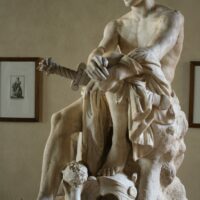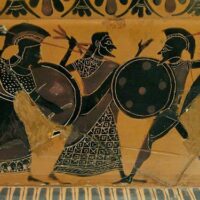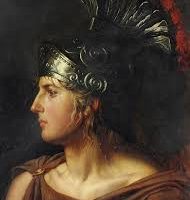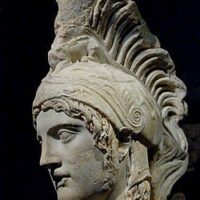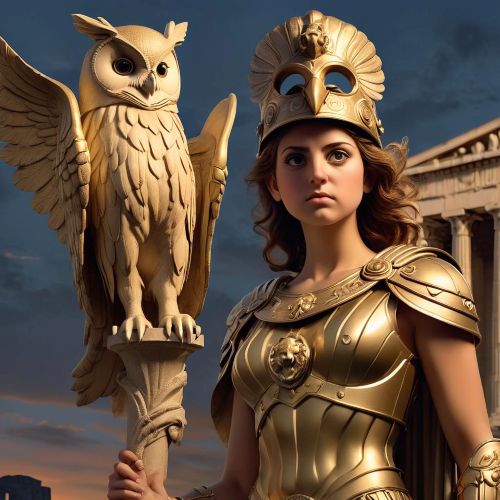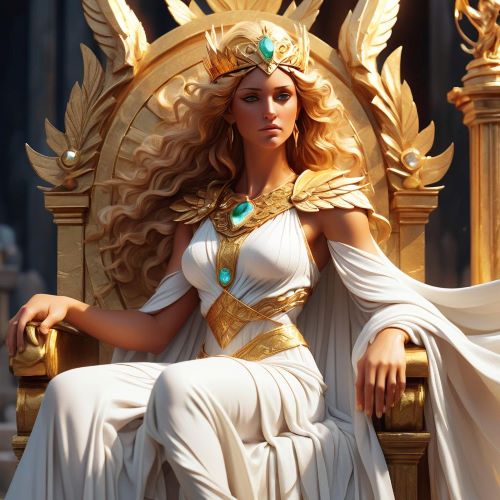Ares : God of War
Listen
At a glance
| Description | |
|---|---|
| Origin | Greek Mythology |
| Classification | Gods |
| Family Members | Zeus (Father), Hera (Mother), Phobos, Deimos, Harmonia (Children) |
| Region | Greece |
| Associated With | War, Strength, Endurance |
Ares
Introduction
Ares is one of the most intriguing and controversial figures in Greek mythology, widely recognized as the god of war. Unlike Athena, who embodies strategic warfare and disciplined tactics, Ares represents the chaotic and ferocious side of conflict—the raw, unbridled violence of battle. Born to Zeus and Hera, he occupies a central position among the Twelve Olympians, yet his presence often inspired fear rather than devotion. Ares’ mythos highlights the Greeks’ ambivalence toward war: while they acknowledged it as a necessary and divine force, his impulsive, bloodthirsty temperament made him a god both respected and distrusted. In the Roman pantheon, his counterpart Mars gained a far greater reverence, associated not only with war but with honor, agricultural protection, and civic virtue, illustrating the cultural differences in the perception of martial divinity.
Physical Traits
Depictions of Ares consistently emphasize his physical prowess and commanding presence. Ancient Greek artists portrayed him as a tall, muscular man, often exceeding six feet in height, with a strong build that conveys both agility and brute force. His appearance is marked by a full beard, shoulder-length dark hair, and intense brown eyes, which are said to gleam red in the heat of battle. Clad in bronze armor and equipped with a sword, spear, shield, and helmet, he is frequently shown mounted on a chariot, charging into the heart of conflict. Unlike other gods who exude elegance or serenity, Ares radiates a palpable sense of aggression, a visual representation of the primal instincts he governs. Even in statuary and vase paintings, his posture and facial expression convey menace, impatience, and the anticipation of violence, underscoring the stark, intimidating nature of the war god.
Family
Ares’ lineage plays a crucial role in understanding his character. As the son of Zeus and Hera, he inherited the authority and divine might of the Olympian rulers, yet he remained largely isolated from adoration within his own family. Hera, known for her jealous and critical nature, reportedly harbored resentment toward him, while Zeus frequently expressed frustration at Ares’ reckless tendencies. His romantic liaisons, particularly with Aphrodite, created enduring myths, as the goddess of love herself embodied qualities that contrasted with Ares’ violent impulses. Together, they fathered several children, including Phobos (Fear) and Deimos (Terror), who personify the emotional impact of war, Harmonia, representing fleeting unity, and in some accounts, Eros, the embodiment of desire and attraction. These offspring illustrate the intertwining of violence, fear, passion, and harmony within the mythological narrative of Ares. His relationships with other deities, including rivalries with Athena and interactions with Artemis or Hades, further highlight the multidimensional aspects of his divine life.
Other names
Ares was referenced by numerous epithets across different Greek regions, reflecting both the fear he inspired and the multifaceted nature of his character. The earliest cult name, Enyalios, emphasized his martial identity, while terms like Andreiphontes, “man-slaying,” and Brotoloigos, “bloodthirsty,” underscored the violent and uncontrollable aspects of his persona. Thêritas, meaning “beastly,” and Miaephonus, “bloodstained,” reinforced the notion of a deity intimately tied to the chaos of war. Even the name Ares itself is derived from the Greek ἀρή (arē), meaning “ruin” or “bane,” signaling the destructive force he embodies. While Greek worship of Ares was limited and often cautious, his Roman counterpart Mars was revered as a guardian of civic order and agricultural prosperity, a contrast that illustrates differing cultural attitudes toward martial deities. Ancient hymns, such as the Old Latin Carmen Arvale, invoke Mars in ways that mirror the Homeric depiction of Ares, blending fear, respect, and ritualized supplication.
Powers and Abilities
The power of Ares extends far beyond mere physical strength. As the god of war, he possesses the ability to manipulate conflict, instigate battles, and inflame aggression among mortals and gods alike. His combat skills are unparalleled, combining agility, reflexes, stamina, and endurance, making him nearly invincible on the battlefield. Ares’ divine resilience includes immunity to disease, rapid regenerative abilities, and resistance to mortal weapons. His influence over fear and panic allows him to disrupt formations, intimidate enemies, and psychologically dominate the battlefield. Despite these formidable powers, myths often portray Ares as fallible. In Homer’s Iliad, for example, he is wounded by Diomedes with Athena’s guidance, demonstrating that sheer strength without strategy can be overcome. His domain also encompasses the chaotic, unpredictable nature of war itself, representing not just physical violence but the emotional and societal turmoil it generates.
Modern Day Influence
The legacy of Ares continues to shape contemporary culture in diverse ways. Literature, film, and video games often draw upon his image as a symbol of aggression, conflict, and the warrior archetype, appearing in works ranging from Rick Riordan’s Percy Jackson series to DC Comics’ Wonder Woman. In psychology, Ares represents the archetype of aggressive masculinity, providing a framework for understanding impulses, competitive behavior, and interpersonal conflict. His myth also informs military symbolism, with names, insignias, and even spacecraft, such as NASA’s Ares rockets, reflecting his enduring association with strength and battle. Beyond entertainment and symbolism, Ares’ stories continue to offer insight into human nature, exploring themes of rage, courage, fear, and the duality of destruction and protection. The figure of Ares remains a vivid cultural touchstone, bridging ancient Greek spirituality with modern explorations of heroism, conflict, and the human psyche.
Related Images
Source
Britannica. (n.d.). Ares God, Myths, Siblings, Family, & Facts. Retrieved September 13, 2025, from https://www.britannica.com/topic/Ares-Greek-mythology
Mythology Inquirer. (n.d.). What Powers Did Ares Have In Greek Mythology?. Retrieved September 13, 2025, from https://mythologyinquirer.com/what-powers-did-ares-have-in-greek-mythology/
The Greek Gods. (n.d.). A deep dive into Ares: the Greek myth. Retrieved September 13, 2025, from https://www.thegreekgods.org/ares/
ARES – Greek God of War & Battlelust (Roman Mars). (n.d.). https://www.theoi.com/Olympios/Ares.html
Contributors to Wikimedia projects. (n.d.). Ares – Wikipedia. https://en.wikipedia.org/wiki/Ares
Mark Cartwright. (2017). Ares – World History Encyclopedia. https://www.worldhistory.org/Ares/



